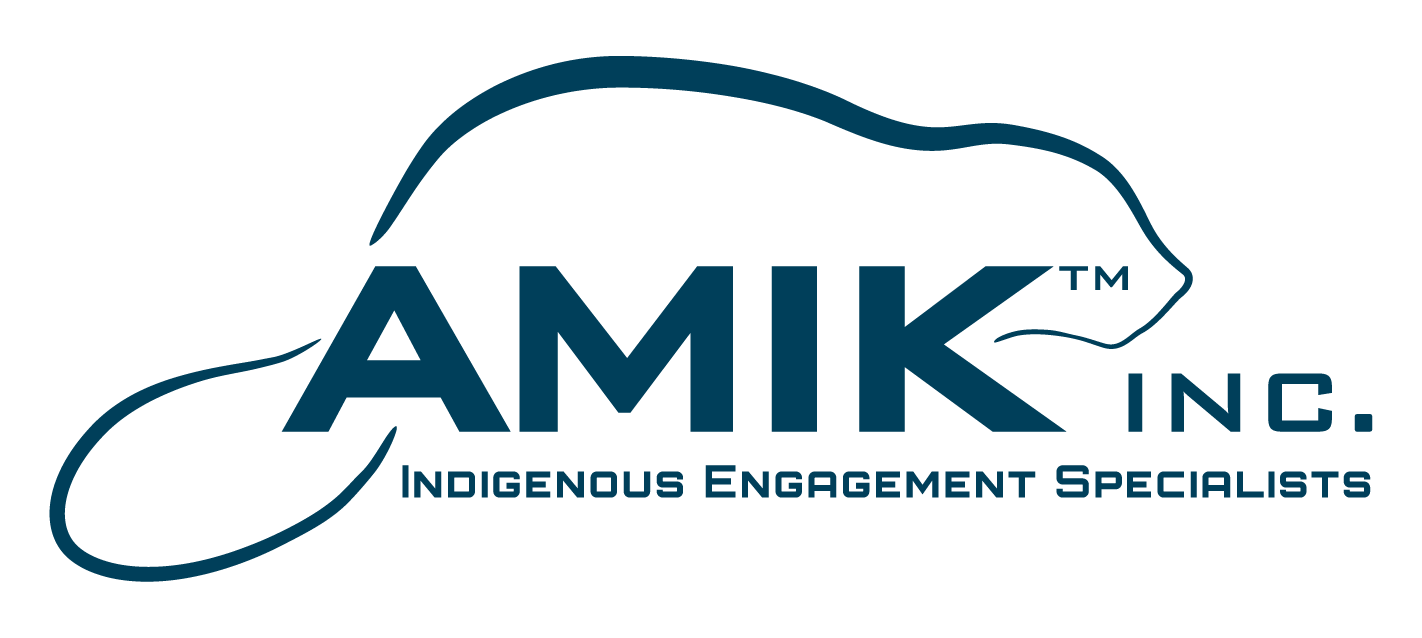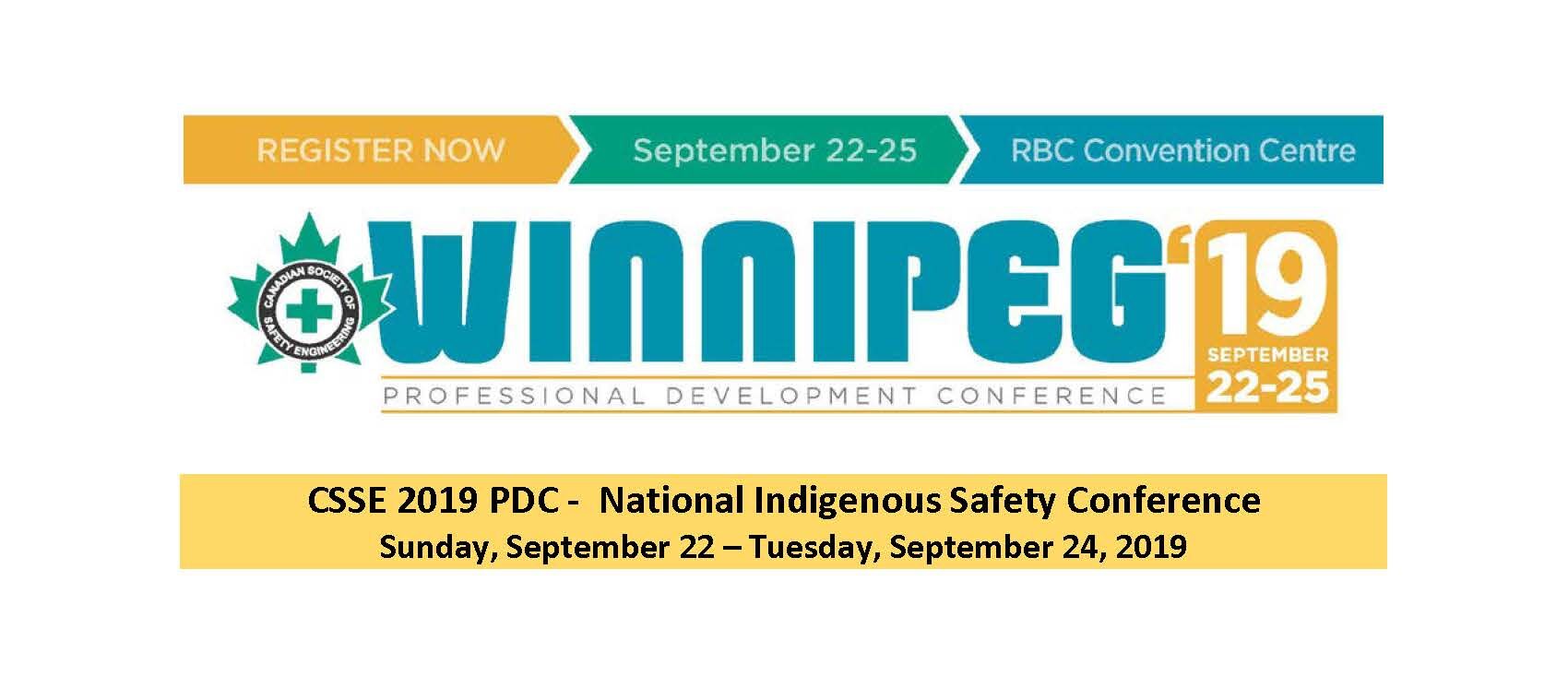CSSE 2019 PDC – National Indigenous Safety Conference
Sunday, September 22 – Tuesday, September 24, 2019
CSSE will host this historic national indigenous safety conference as a stream within the 2019 PDC Sunday, September 22nd through Tuesday, September 24th, 2019 at the RBC Convention Centre in Winnipeg, Manitoba. Participants of the Indigenous Stream will have full access to PDC programming, meals, and program social events taking place between September 22-24, 2019. Those wishing to participate in the Monday night special event are invited to purchase a ticket which is separate and optional. View full PDC programming here.
Sunday, September 22, 2019 1:00 pm – 4:30 pm
Workshop D – Indigenous Engagement Fundamentals
Presented by: E.J. Fontaine, Eva Wilson-Fontaine
Within the context of safety new and young workers have long been known to represent the highest at- risk group for serious injury and fatality on the job. In Canada, the fastest growing demographic of new and young workers are our indigenous people.
To ensure the successful integration of an Indigenous workforce, its critical to gain a proper understanding of our cultural nuances. Indigenous Engagement starts with a solid foundation upon which to cultivate and nourish a team based on understanding and acceptance. Without a holistic approach, you will miss a key piece of the puzzle.
This workshop will provide the safety practitioner with the understanding required to effectively participate in shaping the future of occupational safety in Canada.
Monday, September 23, 2019 10:45 am – 12:00 pm
1G – Research with Nokiiwin Tribal Council
Presenter: Dr. Vicki Kristeman
This presentation will describe the development of the partnership between Lakehead University and the Nokiiwin Tribal Council. Preliminary results from ongoing research projects such as “Understanding labour force participation, work productivity and disability in the Indigenous context: a partnership with the Nokiiwin Tribal Council” and “Designing an E-health intervention for Indigenous mental health in the workplace: a partnership with the Nokiiwin Tribal Council” will be described. Finally, future research initiatives and ideas will be presented.
Monday, September 23, 2019 1:30 pm – 2:45 pm
Concurrent Session 2E – G’minoomaadozimin
Story in Community Presenter: Priscilla Graham & Gwen Andrews
G’minoomaadozimin means “We Are Living Well”. The G’minoomaadozimin initiative envisions communities where all people are safe whether they are at home, in the workplace or in the community. The communities of Animbiigoo Zaagi’igan Anishinaabek First Nation and Netmizaaggamig Nishnaabeg First Nation have developed community tools to help create this vision. Each community faces its own unique demographic challenges relative to location, population and economics.
Community Champions, Pricilla Graham (Animbiigoo Zaagi’igan Anishinaabek First Nation) and Gwen Andrews (Netmizaaggamig Nishnaabeg First Nation) will describe how they have implemented this vision within their communities. They will explain the process each community took and what challenges they faced as they went through their process.
Monday, September 23, 2019 3:15 pm – 4:30 pm
Concurrent Session 3E – Violence and Harassment in the Workplace – Bill C-65 Toolkit
Presenter: Ken Ogima
Bill C-65 has supported the Canada Labour Code by giving clear guidance that violence and harassment in the workplace will be addressed. The changes include the need for prevention, investigation and support when addressing the issue of violence and harassment.
Working Chief Executive Officer within a large community such as Fort William First Nation, Ken Ogima has been exposed to violence and harassment from a variety of perspectives. Ken will share his lived experiences and how violence and harassment can permeate into our daily lives.
This session will give an overview of Bill C-65, how violence and harassment can exist in community and the anticipated changes from Bill C-65.
Tuesday, September 24, 2019 11:15 am – 12:30 pm
Concurrent Session 4G – Safe Nations Certification – Past – Present – Future
Presenter: Murray Ritchie
In 2014 a survey of first nations economic development corporations and indigenously owned and operated companies concluded that, while there was a great deal of work activity taking place in various traditional territories and first nations land as part of the provincial and federal economic growth strategies, the majority of the work was being conducted by out of province workers and out of country temporary workers.
Of the indigenous organizations surveyed most had been left out of the bidding process due to the lack of contractor prequalification such as ISNetworld rating or COR certification.
In 2015 the First Nations Safety Council of BC began developing a contractor relationship management tool designed to bring all stakeholders to the table ensuring that expectations for prequalification identified and respected local culture and traditions and based on the elements of a 2014 UBC study on engagement the concept of Safe Nations Certification was born.This season will outline the history of the Safe Nations Certification concept, the work that has been done to date and the path forward to see the concept implemented and utilized in British Columbia and beyond.
Tuesday, September 24, 2019 2:00 pm – 3:15 pm
Concurrent Session 5E – Engaging First Nation Communities for Improved Safety Outcomes – University of Alberta
Presenters: James Lamouche & Nimmi Dua
The Yellowhead Tribal Council represents four First Nations in the western portion of Treaty 6 Territory. These nations include: Alexander First Nation, Alexis Nakota Sioux Nation, O’Chiese First Nation, and Sunchild First Nation.
In 2017 project funding was secured through the Government of Alberta’s OHS Research Grant program to facilitate engagement with the Yellowhead Tribal Council (YTC), in partnership with the University of Alberta and the Yellowhead Tribal College, to define the member nations’ needs in the area of Occupational Health and Safety.
The intent of the study was to formulate designs for educational programming, training, and capacity development.
This session will share information on working in partnership with First Nations and First Nation institutions; utilizing Indigenous research methods and share the initial results from the project.
Tuesday, September 24, 2019 3:45 pm – 5:00 pm
Concurrent Session 6E – Challenges With OH&S Jurisdiction – Panel Discussion
Facilitator: Stacey Maguire
There are fourteen OH&S jurisdictions in Canada – one federal, ten provincial and three territorial each having its own occupational health and safety legislation.
While many First Nations operations fall under the federal guidelines there are many who do not which creates challenges, and often conflict, in both community governance and economic development.
Many of those who do fall under federal jurisdiction have embarked on a variety of economic development activities which, regardless of the nation’s reporting requirements, must also report provincially or territorially.
Many economic development corporations are unable to take part in various business opportunities as they lack prequalifying certifications such as Certificate of Recognition (COR), ISNetworld ratings and various other contractor management certifications. This leaves many dependent of joint partnerships in order to bid mega-project work.
Many of the nations, regardless of OHS jurisdiction, find themselves participating in several classification unites depending on the types of economic development activities they are undertaking. This required cumbersome reporting and bookkeeping, participation in several industry health and safety associations with various levies charged against their assessed payroll.
All these challenges have the potential to create barriers to economic development, growth and strategic capacity building within many nations.
This session will explore these, and other, challenges with panelists from across Canada sharing their experiences and what, if any, actions are being taken in their home province or territory and conclude with a question and answer session whereby participants can share their thoughts and ideas with the panel.
REGISTER NOW!
HOTEL INFORMATION – RADISSON HOTEL WINNIPEG DOWNTOWN
Conveniently located in the South Portage neighbourhood, Radisson Hotel Winnipeg Downtown is within sight of the Burton Cummings Theatre and area shopping centres.
Open on weekdays from 7:30 a.m. to 5 p.m., their skywalk connects you to Cityplace, Bell MTS Place and Winnipeg Square. The hotel is also less than 20 minutes from Winnipeg James Armstrong Richardson International Airport (YWG) and within a 10-minute walk of the Canadian Museum for Human Rights, the Exchange District, the RBC Convention Centre and Chinatown.
CSSE has secured a block of rooms at the Radisson Hotel Winnipeg Downtown, 288 Portage Avenue, Winnipeg, MB at the group rate of $234.00 per night.Book your accommodations by calling the hotel directly at 204-956-0410 or toll free at 1-800-333-3333 before August 22, 2019. Reservations must be changed/cancelled at least 24 hours prior to your expected arrival date to avoid penalties. Please tell the reservation agent you are with the Canadian Society of Safety Engineering (CSSE) conference to secure the group rate.
SPEAKER BIOS
MAGUIRE, STACEY
Stacey Maguire is a proud Mi’kmaq woman from Glooscap First Nation near Hantsport, NS. She comes from a strong line of Mi’kmaq woman leaders and artisans (basket makers) and is pleased to see that trend continuing with her daughter, Skylar. Stacey graduated from Acadia University in 2007 with a Bachelor of Business Administration specializing in marketing. Throughout her career she has focused on continuous education and skills development. At present she is working to complete her OHS Diploma from UNB after having received her certificate in OHS from UNB in 2017. Recently Stacey has completed the certification process and is a Canadian Registered Safety Technician (CRST) as recognized by the Board of Canadian Registered Safety Professionals. In partnership with Glooscap First Nation (GFN), Stacey completed a 16-month mentorship program with a Safety Services company, earning recognition as an OHS Practitioner. Stacey is honoured to be working for Glooscap Ventures, as part of Glooscap First Nation, as the Senior Health and Safety Manager to develop and implement a strong Workplace Health and Safety Management System.
Currently, Stacey is the Vice Chair for the Canadian Society for Safety Engineering (CSSE) – Western Nova Scotia Chapter and the Indigenous member from the Atlantic Region for the CSSE Indigenous Relations Task Force. Prior to coming to GFN, Stacey had owned her own business and worked for the Confederacy of Mainland Mi’kmaq Tribal Council as the Economic Development and Employment Advisor. Stacey’s goal is to build a strong safety culture within her own community while working with other First Nations and safety associated partners to assist other First Nation communities with their safety initiatives. The goal of a Mi’kmaq Safety Association is well within her capacities and vision.
DUA, NIMMI
Since joining the Occupational Health and Safety (OH&S) Certificate Program in 2004, Nimmi Nayyer-Dua’s leading and managing skills have been instrumental in positioning the University of Alberta’s OH&S Program as a cornerstone for safety in the province of Alberta and the leading Occupational Health and Safety Program in Western Canada. She continues to engage industry partners, work with talented subject matter and industry experts to develop current and relevant courses in emerging and contemporary topics to support the changes in OH&S. Under her leadership and dedicated support from her team the programs’ course offerings now support the laddering opportunity for health and safety professionals from OHS Certificate to Professional Diploma in OH&S with the opportunity to complete mini- specializations through various series along the learning journey: Series in Workplace Wellness Leadership, Project Management, Change Management, Leadership, and Artificial Intelligence to name a few.
FONTAINE, E.J.
Growing up in Manitoba’s First Nation communities, E.J. is intimately familiar with the systemic barriers that Indigenous people continue to face. With exceptional business acumen and the courage to challenge the status quo, he has successfully blazed new trails upon which others now follow. He has over 30 years of experience working with Indigenous communities and organizations in various capacities and projects, including employment and training, economic development, evaluating programs, conducting labour market research studies and data analysis and developing business and marketing plans. He possesses valuable experience in Indigenous engagement and in the management of projects at the local, regional and national levels. As the President and CEO of AMIK Inc. E.J. is recognized as a national leader in recruitment and retention strategies involving the Indigenous workforce.
KNIBB-LAMOUCHE, JAMES
James Knibb-Lamouche is Cree/Métis and grew up in Treaty 8 Territory, near kapawe’nohk (Grouard) on the shores of the Lesser Slave Lake. As a Research Officer with the National Aboriginal Health Organization he was provided with the opportunity to work with Elders and Healers from many different nations and traditions toward the goal of the protection and promotion of Indigenous Knowledge and Traditional Medicines. He also has extensive experience working internationally in the areas of Indigenous Knowledge, Indigenous Rights, multilateral environmental agreements, and intellectual property rights. His research experience includes the Pulmonary Research Institute at the University of Alberta as well as the Dana Farber Cancer Institute in Boston, Massachusetts. James has also served as both a participant and coordinator for the Four Directions Summer Research Program, and a research fellow at Harvard Medical School.
James has served as Director of Research and Indigenous Health Sciences Coordinator at University nistameyimakanak Blue Quills (UnBQ), where his focus was the development of a program that prepared Indigenous students for the rigors of post-secondary health science programs with a foundation that provided access to, and education in, Indigenous Knowledge, culture, ceremony, and language. Most recently, James was the Associate Director of Indigenous Student Services at McMaster University, Hamilton, Ontario.
KRISTMAN, DR. VICKI
Dr. Kristman is an Associate Professor in the Department of Health Sciences at Lakehead University and the Inaugural Director for a new Research Institute at Lakehead University: EPID@Work – Enhancing the Prevention of Injury and Disability@Work. She also holds appointments in the Northern Ontario School of Medicine, and the Institute for Work & Health in Toronto. She holds a doctoral degree in epidemiology from the University of Toronto and completed the CIHR Work Disability Prevention strategic training program as a postdoctoral fellow at the University Health Network in Toronto. In 2014, Dr. Kristman was awarded a prestigious CIHR New Investigator Award for her program of research on “Preventing Work Disability through Accommodation”. She is currently leading projects to test the effectiveness of a supervisor training program to prevent prolonged work disability; to identify factors associated with Indigenous work, health and safety, and to determine factors associated with supervisors’ support for providing work accommodations for workers with mental health disorders.
OGIMA, KEN
Ken Ogima is the Chief Executive Officer (CEO) with Fort William First Nation (FWFN) since June of 2016. Ken’s primary role as CEO is to lead the operations of the First Nation and to develop a positive workplace organizational culture. The delivery of FWFN’s highly comprehensive programs and services is achieved through a collaborative approach and linear management style with the senior management team; program managers and front-line program staff. Ken oversees an operational budget comprised of Federal, Provincial and Own Source Revenue. The First Nation employs 71 full time staff and 25 part-time and seasonal workers. The First Nation services 2500 members living both on and off-reserve.
RITCHIE, MURRAY
Murray Ritchie is a founding member and the Volunteer Executive Director of the First Nations Safety Council of BC. He holds a Master of Science degree in Occupational Safety and Health from the University of Greenwich and has over 30 years HSE Consulting experience spanning five continents. Having grown up on the shores of Lake Winnipeg and the banks of the Red River in traditional Ojibway territory he has carried his childhood connection to indigenous community and traditions into his professional life with a passion for building capacity and supporting indigenous workers worldwide. He now makes his home on Vancouver Island in unceded Coast Salish Territory and the ancestral lands of the Snuneymuxw (Soo-nay- mook) First Nation. He has been a long-time member and supporter of the CSSE and continues his consulting practice as the Managing Director at Tri-Lens Safety. He has a passion for education and knowledge transfer amongst new and young workers having sat as a past member of the Program Advisory Committee at BCIT and now working as a contract instructor for the Faculty of Extension at the University of Alberta.
WILSON-FONTAINE, EVA
Eva Wilson-Fontaine is a member of the Peguis First Nation and is a co-founder of AMIK Inc. Her professional career has been devoted to working with Indigenous communities in the social services, training and employment, employee retention and she is currently the team leader with ANISH Corporation. Her work with AMIK™ involves delivering cultural awareness sessions, workshop facilitation, presentations on the effects and impact of Indian residential school. She is a certified master facilitator in the Smart Work Ethics workforce employability skills curriculum. She has served as a trustee of the Helen Betty Osborne Memorial Foundation, co-chair for the Women as Career Mentor Gala Dinner and a board member of Ikwe Widdjiitiwin Women’s Shelter and in October 2011, Eva and her husband and business partner, E.J. Fontaine, received the Aboriginal Business Leadership Award from Asper School of Business, University of Manitoba.



